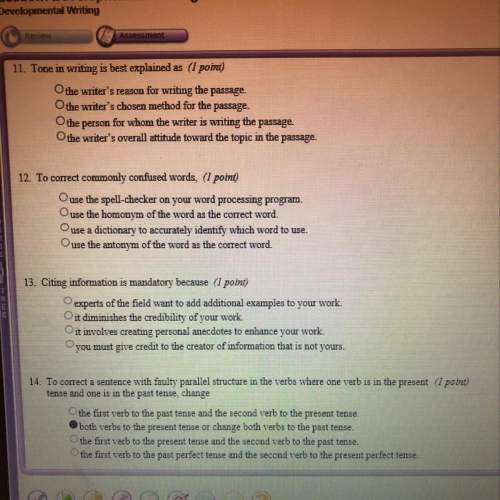Civil Disobedience
Part 1
Most people remember Gandhi and Dr. Martin Luther King, Jr. a...

English, 18.07.2021 01:00 Randy11111
Civil Disobedience
Part 1
Most people remember Gandhi and Dr. Martin Luther King, Jr. as reformers who practiced non-violent forms of protest and advocacy. Both effectively changed the popular opinion about emotional issues for their countries and brought in a wave of change that was long overdue. But the practice of non-violent protest, or civil disobedience, started long before either Gandhi or King. It began with a quiet, shy poet who is best known for writing a lot about a pond.
Henry David Thoreau lived from 1817 until 1862, mainly in the area of Concord, Massachusetts. The issue that would tear the country apart in the 1860s had already begun dividing the nation. Thoreau was only 14 when Nat Turner led the slave rebellion in Virginia and was later hanged. In his late 20s, Thoreau began speaking against slavery in public, echoing the voices of freedmen like Frederick Douglass and Lewis Hayden.
Thoreau believed that a government that supported slavery was corrupt and immoral. He was also deeply suspicious of government. For these and other reasons, Thoreau refused to pay his poll tax for a number of years. The poll tax was a legal tax owed by every person. It was basically a tax on one's body. After not paying for years, he was at last arrested. He spent only one night in jail, however, as a relative paid the tax for him. He was reportedly furious that any tax was paid on his behalf.
It was this experience that Thoreau wrote about in an essay called "Civil Disobedience." In this essay, he argued that being moral and just came before allegiance to government. He wrote “If the machine of government is of such a nature that it requires you to be the agent of injustice to another, then, I say, break the law." He also felt that voting was not enough to ensure that the right thing be done. He wrote that "even voting for the right is doing nothing for it… A wise man will not leave the right to the mercy of chance…" He felt that one had a moral responsibility to resist unjust laws.
Which line from Part 1 best explains Thoreau's message?
Thoreau began speaking against slavery in public, echoing the voices of freedmen like Frederick Douglass
He was reportedly furious that any tax was paid on his behalf
It was this experience that Thoreau wrote about in an essay called "Civil Disobedience."
He felt that one had a moral responsibility to resist unjust laws.

Answers: 2
Another question on English

English, 21.06.2019 21:30
Expand the outline you wrote in lesson 1 about the american dream into an argumentative research essay. as in most essays, you'll need to include an introduction, body, and conclusion. you'll also need to support your claim with evidence
Answers: 2

English, 22.06.2019 00:00
In the excerpt from the emancipation proclamation, which phrase or sentence supports the claim that president lincoln did not want the slaves to take up arms against their former masters?
Answers: 1

English, 22.06.2019 01:00
How does the authors discussion of sujatha baliga's own experiences with abuse and forgiveness contribute to the text
Answers: 2

English, 22.06.2019 14:00
Adjectives tell which one, what kind, and how many. true or false
Answers: 1
You know the right answer?
Questions



English, 26.10.2020 08:40

Mathematics, 26.10.2020 08:40

Computers and Technology, 26.10.2020 08:40

English, 26.10.2020 08:40

Chemistry, 26.10.2020 08:40




English, 26.10.2020 08:40

Mathematics, 26.10.2020 08:40



Mathematics, 26.10.2020 08:40

Mathematics, 26.10.2020 08:40

Physics, 26.10.2020 08:40



Mathematics, 26.10.2020 08:50




